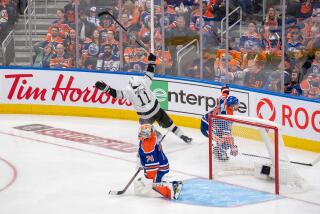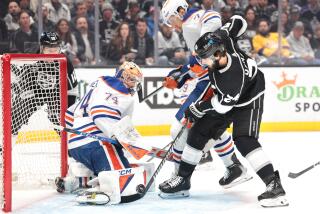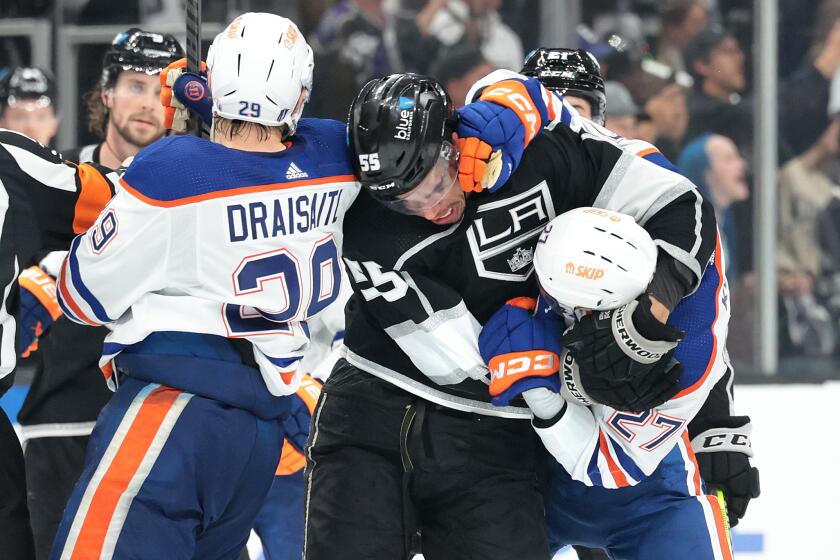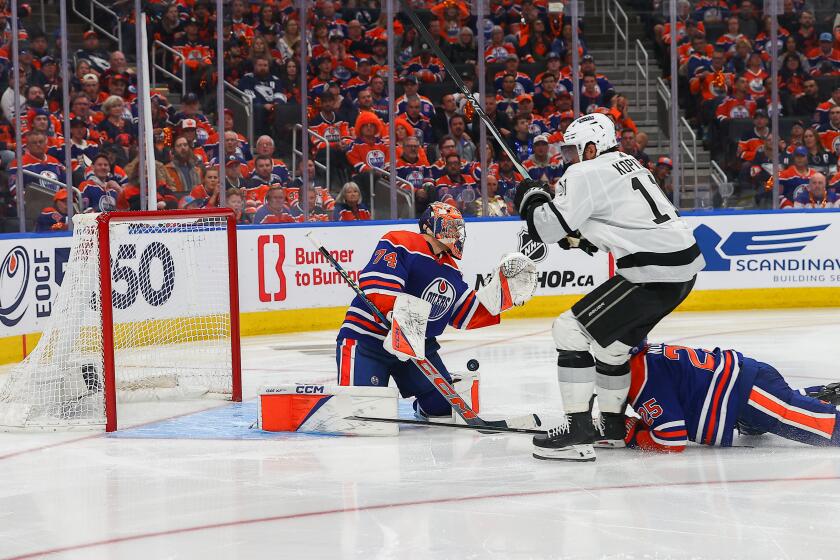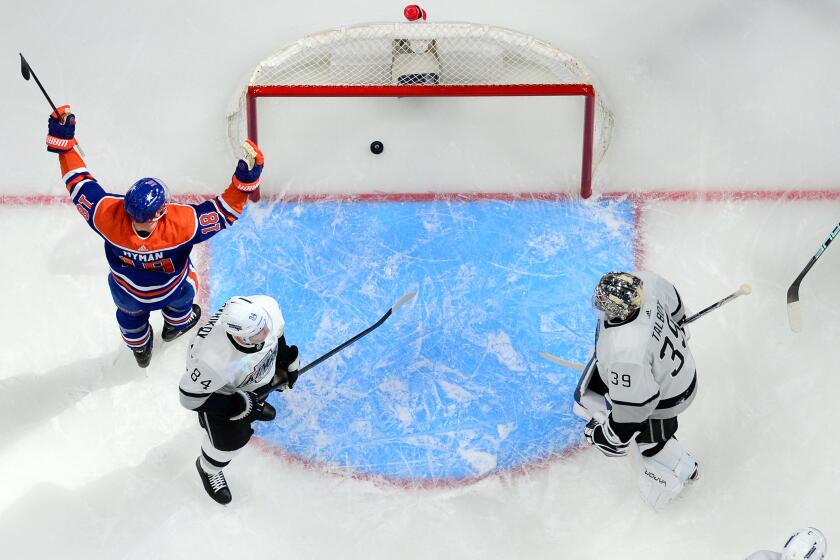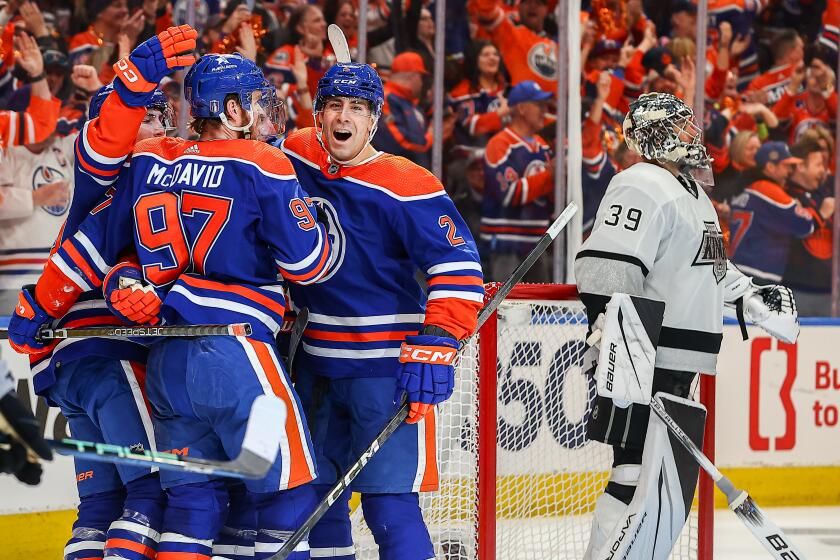Lost Cause
The Kings plan to hire a manager of fan development and a manager of game entertainment.
The Florida Panthers and New Jersey Devils are taking applications for staff accountant positions through the jobs board at nhl.com.
The Mighty Ducks, who added 11 employees to their marketing, sales and ticket departments before Henry and Susan Samueli’s purchase of the franchise was approved last month, plan to add up to 30 people to their business operations in the next month.
In the last few weeks, the Toronto Maple Leafs, Nashville Predators, Dallas Stars and St. Louis Blues extended or renewed their coaches’ contracts.
So, is it reasonable to conclude that the NHL is poised to lift the lockout that Commissioner Gary Bettman imposed Sept. 15?
Not quite. Only where the NHL is concerned can 2+2=5.
Club executives said the flurry of activity was generated by the June 30 expiration of many coaches’ contracts and a need to plan for next season and wasn’t linked to certainty that a new collective bargaining agreement was at hand. And, indeed, a source familiar with the talks said the NHL and the players’ association had missed a self-imposed target of July 1 for a deal because of what the source called “some major roadblocks.”
However, that same source characterized the obstacles as “nothing that will scuttle the deal” and said a framework for a deal could be in place “by the end of the week.”
Representatives of the NHL and the NHLPA met in New York on Tuesday for a second day in a row and debunked rumors that an agreement was hours away. It’s unlikely, then, that a document will be completed in time for the NHL board of governors or for players to vote upon this week. Another source said players had been put on notice to review an agreement soon, probably next week.
Bettman has said next season would begin only if a full collective bargaining agreement were in place, and lawyers have been putting into formal language each point on which negotiators have agreed. Bettman ended the 1994-95 lockout on the basis of a memorandum of agreement with the union, and lawyers on both sides needed seven months to close loopholes and produce an official document.
This agreement will be more complicated because it will, in a first for the NHL, incorporate a salary cap and luxury tax, besides changing the terms of salary arbitration, qualifying offers and entry-level salaries.
If Bettman recommends an agreement to the governors, a majority vote is required for ratification. If the union’s executive committee recommends a deal, a majority vote of the 700-member rank and file is required for approval. If the union rejects a deal that’s backed by the executive committee, the executive committee will be obligated to resign.
“The parties continue to meet regularly and are attempting to resolve all of the many issues that need to be addressed in the context of this negotiation,” Bill Daly, the NHL’s chief legal officer, said in an e-mail Tuesday. “It’s a long process and there’s still a lot of work that needs to be done.”
His NHLPA counterpart, Ted Saskin, took a similar tone.
“The parties continue to negotiate many of the outstanding issues, while at the same time we are documenting areas in which we have reached agreement,” Saskin said. “This is a time-consuming process and everyone is very focused on moving forward, but a lot of work remains to be completed.”
For the 30 clubs, the work of planning for next season is underway.
Most had slashed their staffs through layoffs and attrition but are rebooting their operations so they can roll out public relations campaigns as soon as a deal is ratified. The league is also preparing a major public relations effort in which it will thank fans for their loyalty and highlight offense-friendly rules that are expected to be adopted for next season.
“We’re just trying to prepare for anything that may come,” said Chris McGowan, vice president of sales and marketing for the Kings. “We’re treating this like a regular off-season. We’re planning and doing marketing and PR initiatives and a lot of legwork.
“We’re ready to go. It’s almost like we can push a button and set everything in motion.”
Brian Burke, two weeks into his tenure as general manager of the Ducks, said he interpreted the personnel moves around the league as normal business and not signs of imminent labor peace.
“But I certainly sense that teams are gearing up, even teams that haven’t made announcements yet,” he said.
The Ducks have several positions to fill in hockey operations.
“Once we know we’re playing, we’ll probably be hiring,” Burke said.
He plans to hire a top assistant, a job that’s likely to be offered to Bob Murray, a former NHL defenseman and former general manager of the Chicago Blackhawks.
The Ducks are among the clubs that have announced ticket price cuts, but McGowan said the Kings wouldn’t announce their plans until a deal was done. He said the Kings held focus groups and sent out nearly 4,000 surveys to determine and analyze what fans would want when hockey returned.
“We’ll never forget that the fans are the ones who really suffered,” he said. “Anger, we’ll take. That means they’re passionate.... I’d be foolish to say we’re going to ramp it right up to the pace at which we were selling out in 2003-04, but I think it’s a matter of time.”
*
(BEGIN TEXT OF INFOBOX)
The issues
The remaining issues to be resolved by the NHL owners and the players’ union:
* The length of time clubs will have to buy out old contracts and the length of time general managers and agents will have to study the provisions of the new deal before a free-agent signing period begins.
* The procedure for clubs to make qualifying offers to retain restricted free agents.
* Procedures for the entry draft. Draft order is normally determined by a lottery held among teams that missed the playoffs, and then in reverse order of other teams’ finish. With no season on which to base the selection, each team might be given an equal shot at the No. 1 pick, Canadian junior scoring sensation Sidney Crosby. Also proposed: a weighted lottery based on the finish of the previous three seasons.
* The extent of rule changes designed to enhance offense and the flow of the game. Shootouts to settle games that are tied after regulation time and overtime are just about certain, as is reducing the width of goaltenders’ leg pads. Radical suggestions, such as ignoring the red line for the purpose of allowing two-line passes, might meet resistance from the new competition committee, which includes players, general managers and an owner.
-- Helene Elliott
*
Making progress
What the owners and players’ union have agreed to:
* All existing contracts will be subject to a 24% rollback.
* Clubs will operate under a salary cap whose ceiling is likely to be about $38 million and whose floor is likely to be about $23 million. Player costs cannot exceed 54% of league revenue.
* Clubs will be allowed to buy out contracts at two-thirds of the contract’s value but cannot immediately re-sign players they have bought out.
* Entry-level contracts will cover four years instead of three, as in the old agreement, and compensation for entry-level players will be limited to $850,000 per year.
* The age at which players can qualify for unrestricted free agency will stay at 31 in 2005-06 but will be 30 for 2006-07, 29 for 2007-08 and 28 in the last three years of the agreement.
-- Helene Elliott
More to Read
Go beyond the scoreboard
Get the latest on L.A.'s teams in the daily Sports Report newsletter.
You may occasionally receive promotional content from the Los Angeles Times.

